高中英语必修二Module+2+Unit+3+Computers+教案.doc
电子商务教案:高一英语必修2Unit3Computers全单元教案
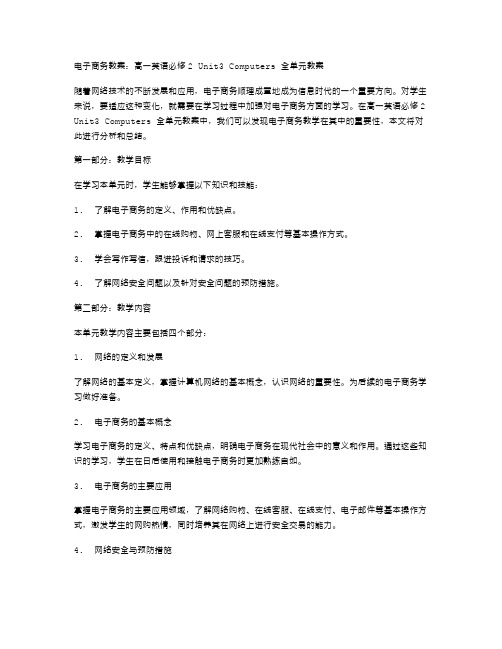
电子商务教案:高一英语必修2 Unit3 Computers 全单元教案随着网络技术的不断发展和应用,电子商务顺理成章地成为信息时代的一个重要方向。
对学生来说,要适应这种变化,就需要在学习过程中加强对电子商务方面的学习。
在高一英语必修2 Unit3 Computers 全单元教案中,我们可以发现电子商务教学在其中的重要性,本文将对此进行分析和总结。
第一部分:教学目标在学习本单元时,学生能够掌握以下知识和技能:1.了解电子商务的定义、作用和优缺点。
2.掌握电子商务中的在线购物、网上客服和在线支付等基本操作方式。
3.学会写作写信,跟进投诉和请求的技巧。
4.了解网络安全问题以及针对安全问题的预防措施。
第二部分:教学内容本单元教学内容主要包括四个部分:1.网络的定义和发展了解网络的基本定义,掌握计算机网络的基本概念,认识网络的重要性。
为后续的电子商务学习做好准备。
2.电子商务的基本概念学习电子商务的定义、特点和优缺点,明确电子商务在现代社会中的意义和作用。
通过这些知识的学习,学生在日后使用和接触电子商务时更加熟练自如。
3.电子商务的主要应用掌握电子商务的主要应用领域,了解网络购物、在线客服、在线支付、电子邮件等基本操作方式,激发学生的网购热情,同时培养其在网络上进行安全交易的能力。
4.网络安全与预防措施学习网络安全问题,包括网络钓鱼、黑客攻击等威胁,同时介绍预防措施,如使用安全密码、不信任陌生人等。
第三部分:教学方法1.情境式教学法教师可以在课堂上创设场景,让学生身临其境地感受网购、网银等网络操作过程中的实际情况,尤其是收货、付款等情节,促使学生在虚拟环境中深刻体验电子商务的优缺点。
2.角色扮演法在涉及写作写信内容的部分,教师可以利用角色扮演的方式来引导学生以客户或数据管理员的身份进行交流,加深对写作写信、请求、反馈等技能的学习。
3.实验教学法在实际网络环境中,演示电子商务操作和网络安全问题,让学生在实践中学到经验和技能。
人教版高中英语必修二unit3+Computers+教案3.doc
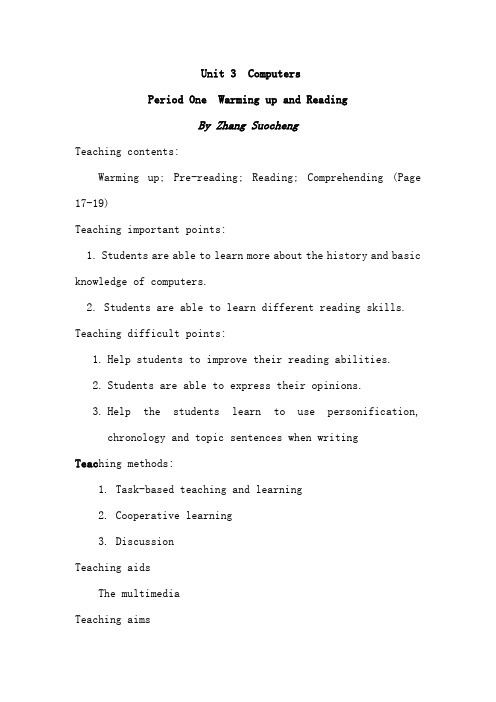
Unit 3 ComputersPeriod One Warming up and ReadingBy Zhang SuochengTeaching contents:Warming up; Pre-reading; Reading; Comprehending (Page 17-19)Teaching important points:1. Students are able to learn more about the history and basic knowledge of computers.2. Students are able to learn different reading skills. Teaching difficult points:1.Help students to improve their reading abilities.2.Students are able to express their opinions.3.Help the students learn to use personification,chronology and topic sentences when writingTeac hing methods:1. Task-based teaching and learning2. Cooperative learning3. DiscussionTeaching aidsThe multimediaTeaching aimsKnowledge aims:1. Students are able to learn the useful new words and expressions in this passage2. Students are able to know basic knowledge about computers.Ability aims:1. Help students to improve their reading abilities.2. Train the students’ability to collect usefulinformation from the Internet by themselves.Emotional aim:Guide the students to work hard to create more wonderful and convenient inventions for human beings.Teaching procedureStep One Warming up1. Talk about the importance of computer and the Internet.2. Cooperative learning: Show some pictures of the development of computers.Questions: 1. What can you see in the pictures?(abacus, calculator, huge computer, PC, laptop, PDA, robot)2. What do you think will be the next development?Discussion (pair work): What do they have in common, in your opinion?Some useful expressions: I think that…In my opinion…I believe that… What’s your reason? Why do you think so?Step Two Pre-readingAsk the students to predict what the text is going to be about from the title and the pictures.Step Three While-readingTask 1: Skimming the passage for the general ideaQ 1: What is the main idea of the passage?This passage is mainly about the history of the development of computers.Q 2. Who am I?I am a computer.Task 2: Scanning for detailed information.Read the passage and finish the timeline below. (Ex. 1 on Page19)Task 3: Listen and read aloudTas k 4: Read the passage again. In pairs find out the topic sentence of each paragraph and the supporting details. (Ex.2 on Page19)Question & Summary: How to find out the main idea of a paragraph quicklyA topic sentence sets out / explains the main idea of a paragraph.A topic sentence is usually the first or the last sentence of a paragraph.Step Four Post-readingTask 5: Guessing gamesFind the word or expression for each of the following meanings from the text according to the context.(Ex. 1 on Page 20)Task 6: True or False?1. The passage mainly tells us the history of the computer.2. The computer was considered simple-minded before it got artificial intelligence.3. Charles Babbage invented the first computer.4. Since its birth the computer has been built to take the place of the human race.Step Five Brief summaryWhat have we learnt in this class?1) some words about computerscalculating machine, analytical machine, universal machine, PC, laptop,tubes, transistors, chips, network, World Wide Web, communications, finance, trade, robots, mobile phones, medical operations, space rockets2)the short history of the development of computersgreat changes in size—from__________ to ___________great changes in memory—from___________to ___________great changes in function—from___________to ___________great changes in application—from___________to ___________3) some scientists relating to computers________________built the analytical machine.________________made the first computer.4) some good methods of writinga. in the first person—personification “Who am I? ”b. in an order of time—chronologyc. topic sentencesStep Six Discussion in groups of fourWork in groups of four and discuss the advantages and disadvantages ofcomputers.Step Seven HomeworkRead the passage again. Underline the words, phrases or sentences that you don’t understand, and try to solve the problems using context clues and the dictionary.Design on the blackboardUnit 3 ComputersPeriod One Warming up and ReadingMain idea of the passage:This passage is about the history of the development of computers.Topic sentences of each paragraph:Paragraph 1: Over time I have been changed quite a lot.Paragraph 2: These changes only became possible as my memory improved.Paragraph 3: Since the 1970s many new applications have been found for me.Summary: What have we learnt in this class?1) some words about computers2) the short history of the development of computers3) some scientists relating to computers4) some good methods of writinga. in the first person—personification “Who am I? ”b. in an order of time—chronologyc. topic sentences品味人生1、不管鸟的翅膀多么完美,如果不凭借空气,鸟就永远飞不到高空。
人教版高中英语必修2《Unit3Computers》教案
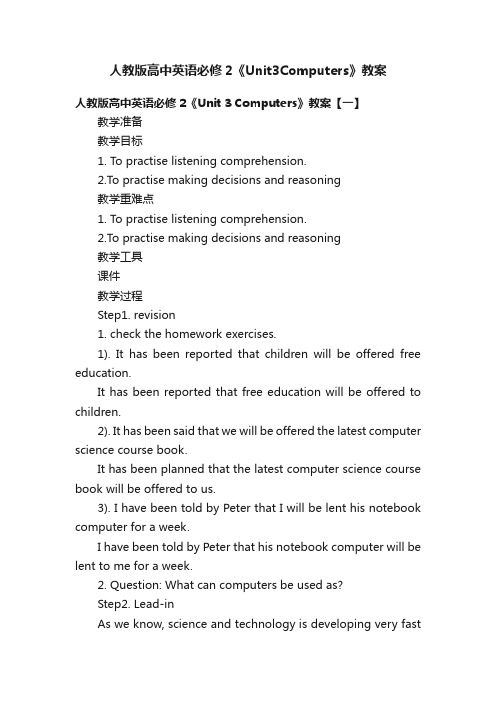
人教版高中英语必修2《Unit3Computers》教案人教版高中英语必修2《Unit 3 Computers》教案【一】教学准备教学目标1. To practise listening comprehension.2.To practise making decisions and reasoning教学重难点1. To practise listening comprehension.2.To practise making decisions and reasoning教学工具课件教学过程Step1. revision1. check the homework exercises.1). It has been reported that children will be offered free education.It has been reported that free education will be offered to children.2). It has been said that we will be offered the latest computer science course book.It has been planned that the latest computer science course book will be offered to us.3). I have been told by Peter that I will be lent his notebook computer for a week.I have been told by Peter that his notebook computer will be lent to me for a week.2. Question: What can computers be used as?Step2. Lead-inAs we know, science and technology is developing very fastand computers have become smaller and smaller. They have been used in many fields. So, the 21st century is the century of information technology What does it mean? Does information technology/ IT only mean things like computers? Of cause not. Actually, it means more than computers. Computers are just one kind of IT. What else do you know is part of IT?(TV, radio, CD-ROM, DVD, books……)Step3. Listening (SB)1. Pre-listening: What are the changes brought by different forms of IT ?What are the advantages and disadvantages of them ?2. While-listening:Go through the chart and make sure the students look at the chart before they listen to the tape. (This is to sharpen their attention and listen for the answers. This will also help them get the gist of the text.) Then Listen to the tape and finish filling in the chart. (If necessary, play the tape for several times.) Say: After listening to their talk, we know all kinds of IT have both disadvantages and advantages.Let’s check the answers together.Type of IT Advantages DisadvantagesTV You can both listen and watch. You cannot write to friends.Web You can find information. It is very expensive.Radio You can listen to English. You cannot watch a film.Book You can get information. Sometimes it is out of date.3. Post-listening:1) (pair work): decide which type of IT is best for you to use right now. Make your choice and give your reasons by using the following expressions.I think that….In my opinion, ….I believe that….I agree because….I disagree because….I’ve decided that….2) (group work): Discussion :Computers are useful and have brought us lots of good things, but they also cause bad effects. What attitude should we have towards the computer? (Make good use of it but never get trapped by it.)Step4. Speaking1. Pre-speakingSay: From what we have learn, we should admit that computers and the web have a great influence on the school education as well as people’s life. It has come into people’s everyday life and many families hold computers in their homes. Now there is a task for you.2. While-speaking1) Situation: You have been asked by your parents to help choose computers for your home. You and your friend have looked at several computers. Talk about the special things each computer can do. Make a decision about which kind of computer to buy and explain why.Information input: Show students some pictures of different computers (desktop computer & laptop computer & …) Language input: Useful expressions (Repeat it to strengthen students’ ability of use it.)Supporting an opinion Challenging an opinionI think that … , because … Perhaps, but what if / about …?First, … Have you thought about …?One reason is that … What makes you think that …?I think it is better because… I don’t like it because….(Pair work )Use the expressions to support your opinion or challenging other’s opinions.2) Oral report: (individual work )Do an oral report to your father and start your report like this: I looked at many different computers. The one I have chosen is the PEP personal computer. One of the main reasons is that it is suitable for homes. I found that…3. Post-speakingConclusion—What useful expression do we use to make a decision and reason?(In this way, they can review and use the words and phrases again.)Step6 Pre-writingSay: Imagine what problems and delights this android might have to deal with while it is serving you. Try yourself in someone else’s shoes is an important way of understanding how other people feel.Then discuss: You are an android. You work for a family with one child who is very spoiled. The parents want you to do everything for them. The parents are nice, but they often ask you to watch over their child. How do you feel? What would you do if the child asked you to do his/her homework for him/her? Would you ever tell the chi ld “no”?Step7 WritingSay: Write a passage about the result of your discussion! It should contain:What do you have to do?What is the child like?What is the parents’ requirement of the child?What do the parents want you to do?What does the child want you to do?Then what will you do? How do you feel?Sample writing:Hello everybody, my name is Liu Yan.I am a 321 model android.I work for the Li family. Mr and Mrs Li work very hard too.Mr Li is an architect and designs great tall apartment blocks.Mrs Li is a doctor and has to look after many patients.I remember all the plans for Mr Li's projects and can tell Mrs Li which drugs are the best to give any particular patient. And I also look after their library. I store all the books that they borrow from their school or friends in my brain.Of course my brain is as large as a mountain, so work like that is no trouble to me.I really eat books just like people eat food.The Lis have a child who is very spoiled. He needs me to remember all his school textbooks so that I can do his homework for him.He just gives me the information on the subject, what has to be done and the page numbers and I get on with it while he enjoys himself with his friends.Sometimes I don't think it is right to do his homework for him — it's somewhat cheating. However, his parents are very concerned at the pressure of work in school these days.The child has too much homework to do. They like him to go to the key school but they also want him to be able to have hobbies, learn to swim and keep fit! Poor child!So they consider me the most important person in the family after themselves.I am always introduced to their friends and play with visiting children.I am the perfect family academic aid and, although I was not cheap to buy, Mr Li says I was worth every yuan!Step8 AssessmentGet the students to assess their writing ability according to the following the questions:1. Is your composition well developed?2. Are your ideas well organized to the point?3. Do you have a good choice of words and idioms in your writing?4. Do you get a good mastery of complex structures of language?5. What kind of mistakes have you made in your writing?Step9: HomeworkWrite about your discussion. You may begin like this:Hello, everyone. My name is ___. I’m 321 m odel android. I work for the Li family….课后小结学了这节课,你有什么收获?课后习题完成课后习题一、二。
高中英语人教版必修2+Unit+3+Computers+period+1+教案.doc

新课标高中英语必修2 Unit 3 Computer 全单元教案M2 Unit 3 ComputerPeriod 1:Warmin/g up(WHO AM I?)Warming upThis section is an introduction to the topic.It is to get the students thinking about the different ways computers can be made.Do this part of the lesson in pairs and as a speaking activity.Warming up by talking about computerLook at the pictures on page 17. What are they? What do they have in common? Yes, they are computers. Then what is a computer?A computer is a machine which stores knowledge in its memory and does calculations on that knowledge. This knowledge is stored in symbols; it is called data.A computer usually has a monitor to show results. However, some computers can speak; these computers can be used for voice mail.Draw on the blackboard a diagram to illustrate the influence of the computer and the Internet over the school education.Below is a diagram you may like to use.Ask students to look at the diagram and consider, ”What changes have computers and the Internet brought to schools? What changes will they bring to schools in the future?”Ask the Ss to work in groups and to make a list of the possible changes they can think of.When most of the groups have their lists ready, the teacher can hold a class discussion.Write down the major changes the students think of under / beside the diagram.The teacher can add one or two changes that may affect their own teaching.For example, “Computers and the Internet can help busy parents contact teachers by email.”The teacher can end the task with a brief s ummary, or hold a further discussion to find out students' personal opinions about the changes.For example, ask them, “Do you like all these changes? Why and why not? What changes do you like / dislike?”Some information:计算机室A computer frequently requires a boot device. The boot device contains the computer’s operating system and data. Computer programs can be installed onto a computer. Some people think that computers are less useful if they do not have access to the Internet. They think this because the Internet allows the computers to send and receive data and email across the world.曙光3000巨型计算机A computer is now almost always an electronic device. It usually contains materials which are toxic; these materials will become toxic waste when disposed of. When a new computer is purchased in some places, laws require that the cost of its waste management must also be paid for. This is called product stewardship.In some countries old computers are recycled (melted down) to get gold and other metals. This is dangerous, because this procedure releases the toxic waste into the water and soil.Computers become obsolete quickly. Very often they are given away and new ones replace them within two or three years. This makes the problem worse. Computer recycling is thus common. Many projects try to send working computers to developing nations so they can be re-used and will not become waste as quickly. Computer jargon 计算机行话Computer jargon means words to do with computers and surrounding topics. Knowing what these words mean can help you know more about computers. Some people use these words to impress other people (Also known as buzzwords). Examples of jargon:Bit - The smallest data unit, can either be a “0.” or a “1.”.Byte - unit of data. See also Kilobyte, Megabyte, Gigabyte and NibbleCPU –Central Processing Unit, Another name for processorData - Information stored on a computerDisk - A place to store data.Email - Electronic mail.GHz - Gigahertz. Used often incorrectly to describe the speed of a processor. But with some 2.4 GHz processors faster than 3.6 GHz ones, it is clear that it is just a salesman trick.Load - Get data from a diskNibble - Half a ByteSave - Put data on a diskRAM – random-access memory(随机存取存储器), the more the better.USB - Universal Serial Bus(通用串行总线,一种简化了插接多种附件的薄型插座)WWW - World Wide Web, part of the InternetPeriod2-3 Pre-reading & ReadingPre-readingThis can be a continuation of the Warming Up.Let the students discuss the questions set out in the Student's Book.1. Questioning and answering What do you know about computer?●Electronic machine capable of performing calculations and other manipulations of various types of data, under the control of a stored set of instructions. The machine itself is the hardware; the instructions are the program or software. Depending upon size, computers are called mainframes, minicomputers, and microcomputers. Microcomputers include desk-top and portable personal computers.●A multi-function electronic device that can execute instructions to perform a task.●A device that accepts information, processes it, and supplies an output. A computer usually contains memory, a control unit, arithmetic and logical units, and a means for input and output.●a programmable har dware component that is controlled by internally stored programs and that can perform substantial computations (including arithmetic and logic operations) without human intervention. A computer typically consists of one or more processing units, memory units, and associated peripheral input and output devices.●Related to automation and electronic data processing. The Library of Congress commonly classes most computer-related books in HF5548, QA75-76, Z52, T385, and some TK ranges.●a machine for performi ng calculations automaticallycalculator: an expert at calculation (or at operating calculating machines)●A computer is a device or machine for making calculations or controlling operations that are expressible in numerical or logical terms. Computers are constructed from components that perform simple well-defined functions. The complex interactions of these components endow computers with the ability to process information. If correctly configured (usually by, programming) a computer can be made to represent some aspect of a problem or part of a system. If a computer configured in this way is give2. Discussing and sharing How have computers changed our lives?Someday soon, if you haven’t already, you’re likely to plug into the computer network nation growing in our midst. Computer terminals, or small computers connected via modem (a modulator/demodulator circuit for encoding/decoding computer chatter) to ordinary telephone lines, should be as ubiquitous as the telephone itself. They’re a much more use ful and humane tool than the phone, and with corporate America behind them the networks will be everywhere----changing our lives more than any technology since the automobile.Joining a computer network is the same as joining a community. Small systems are like villages, where new members are formally welcomed. The larger networks, the Source and CompuServe, for example, are cities-anonymous, full of life and events, but difficult to fit into.II. ReadingThis is the purpose of the reading and so it is important that the students learn to use all the clues in the text to help them understand the gist of what they are reading.So encourage them to look at the pictures and the heading and guess what the text might be about.Then ask the class to read the passage silently.Make sure the students have the chronology of the development of computers in their minds.Ask them:1. Listening and reading to the recording of the text WHO AM I?Turn to page 18 and listen and read to the recording of the text. Pay attention to the pauses, pronunciation and intonation of the native reader.2. Reading aloud and underlining expressionsNow we are to read the text once again and underline all the expressions in the text. Put them down into your notebook after class as homework.Collocations from WHO AM I?begin as…, a calculating machine, be built as…, follow instructions from…, sound simple, at the time, a technological revolution, write a book, make…work, solve problems, become huge, had artificial intelligence, go back t o…, the size of…, go by, change size, become small and thin, get quick, stand there by oneself, be connected by…, share information by…, talk to…, bring…into…, deal with…, communicate with…, serve the human race3. Reading, identifying and settlingAttention, please! It is time to skim the text one more time and identify the difficult sentences. Try analyzing the structures of the difficult sentences and discuss them among your group members. You may also put your questions to me for help.Chat (online)(在线)聊天To chat is to talk about ordinary things that are not very important. You can chat to one person or to many people. People also use this word now for parts of the Internet where we can talk with many different people at the same time. Usually, you chat on the internet in a chat room or messaging service like AOL(American On-Line) Instant Messenger (AIM), Yahoo Messenger, or MSN Messenger.IV. Closing down by doing comprehending exercisesTurn to page 18 and in pairs do the comprehending exercises No. 1 and 2. Reading and transferringScan the text for information to complete the table below, describing the development of computer.In 1642In 1822In 1936In 1960sIn 1970sAnswer key:1642: The computer began as a calculating machine.1822: The Analytical Machine was made by Charles Babbage.1936: Alan Turing wrote a book to describe how computers could be made to work.1960s: Computers had new transistors and became smaller.1960s: The first family of computers connected to each other.1970s: Computers were brought into people's homes.Now: Computers connect people all over the world togetherV. Explanation1.in common: for or by all of a group 共同的;共有的;共用的。
【人教版】高中英语必修二:Unit 3 Computers 教案
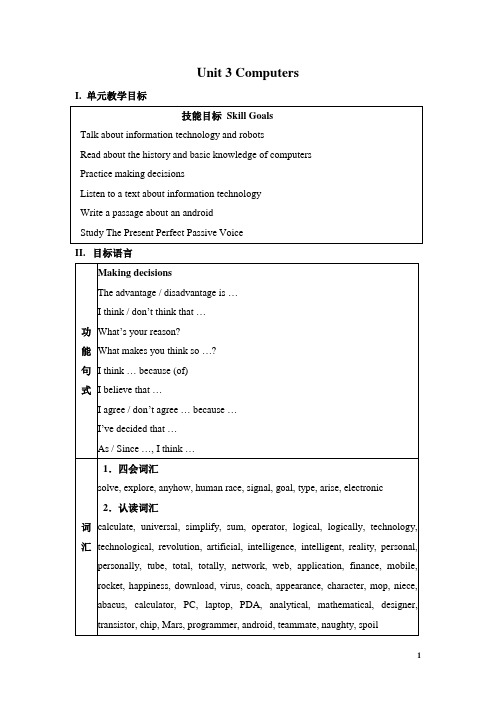
Unit 3 Computers I. 单元教学目标II. 目标语言III. 教材分析与教材重组1. 教材分析本单元以computers为话题,旨在通过单元教学,综合听、说、读、写等多种形式,使学生了解计算机和信息技术的产生和发展过程及其在我们的学习、工作、娱乐等生活中所起的重要作用,激发学生对信息技术的兴趣。
1.1 Warming up提供几幅与计算机有关的图片,形象地说明了计算机的发展历程,并用三个问题引发学生对这一话题的思考,从而起到热身的作用。
1.2 Pre-reading根据文章内容预设问题,检查学生对computers相关知识及应用的了解。
学生对computers的了解可能参差不齐,这更能激发学生想获取更多知识的欲望,从而引出下面的阅读文章——WHO AM I?。
1.3 Reading中以别致的标题WHO AM I?引起学生的好奇心,使学生迫不急待地阅读这篇文章,并判断出“I”是computer,从而对文章的内容印象更深刻。
文章以第一人称的形式按时间先后顺序讲述了computers的产生、发展和现状,并用拟人化的口吻表达了computers乐于为人类服务的精神。
1.4 Comprehending 1 通过scanning的方式完成反映计算机发展历程的时间进程;2 通过填表的形式帮助学生宏观梳理文章结构,找出每个段落的主题句(论点)及具体的支持性论据;3 是读后讨论,要求学生结合自己的生活实际讨论计算机如何改变了我们的生活。
1.5 Learning about language分词汇(Discovering useful words and expressions)和语法(Discovering useful structures)两大部分。
Discovering useful words and expressions 1 根据单词释义写出相对应的词汇,考查学生对WHO AM I? 文章中的重要词汇及短语的理解。
公开课必修2unit3 Computers教案
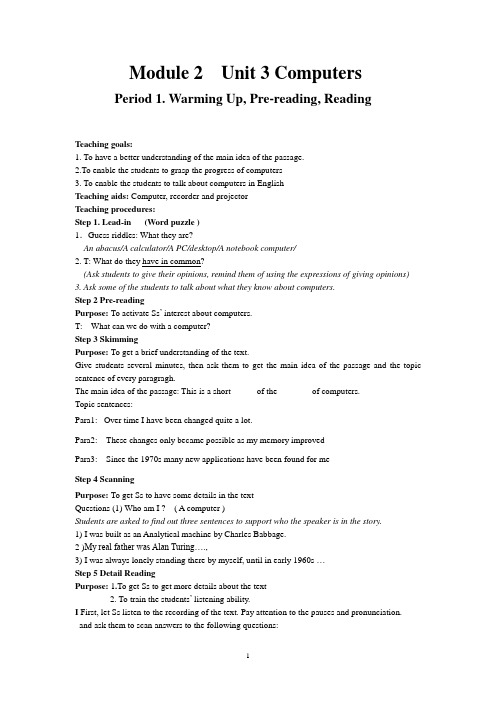
Module 2 Unit 3 ComputersPeriod 1. Warming Up, Pre-reading, ReadingTeaching goals:1. To have a better understanding of the main idea of the passage.2.To enable the students to grasp the progress of computers3. To enable the students to talk about computers in EnglishTeaching aids: Computer, recorder and projectorTeaching procedures:Step 1. Lead-in(Word puzzle )1.Guess riddles: What they are?An abacus/A calculator/A PC/desktop/A notebook computer/2. T: What do they have in common?(Ask students to give their opinions, remind them of using the expressions of giving opinions) 3. Ask some of the students to talk about what they know about computers.Step 2 Pre-readingPurpose: To activate Ss’ interest about computers.T: What can we do with a computer?Step 3 SkimmingPurpose: To get a brief understanding of the text.Give students several minutes, then ask them to get the main idea of the passage and the topic sentence of every paragragh.The main idea of the passage: This is a short _____ of the _______ of computers.Topic sentences:Para1:Over time I have been changed quite a lot.Para2: These changes only became possible as my memory improvedPara3: Since the 1970s many new applications have been found for meStep 4 ScanningPurpose: To get Ss to have some details in the textQuestions (1) Who am I ? ( A computer )Students are asked to find out three sentences to support who the speaker is in the story.1) I was built as an Analytical machine by Charles Babbage.2 )My real father was Alan Turing….,3) I was always lonely standing there by myself, until in early 1960s …Step 5 Detail ReadingPurpose: 1.To get Ss to get more details about the text2. To train the students’ listening ability.I First, let Ss listen to the recording of the text. Pay attention to the pauses and pronunciation.and ask them to scan answers to the following questions:1. Where were you in 1642?2. What happened to you in 1822?3. What were you called in 1936?4. What happened in the 1960s?5. What happened to you in the 1970?II Complete the tableExplain how the computer technology has been developing and complete the following chart. Then give a brief oral presentation on the development of computer technology with the help of the chart.A chain of events showing the development of computer / Changes of the machineTimeline1642: _____________________________________________:1822 : the Analytical Machine was Made by Charles Babbage.1936: _______________________________________________________________________ _____: the first family of computers was connected to each other.1970s: ______________________________________________________________________ Now: _______________________________________________________________________III ComprehendingPurpose: To get Ss to get more details about the text.True or False1.Alan Turing built an Analytical Machine to solve any mathematical problems. (F)2.People began to realize that the computer got cleverer and quicker with time passing. (T)3.The computer began to serve the human race since it was brought into people’s homes.(F)4.Since the 1970s, the computer was used by people around the world through the Internet. (T)5. The larger the computer is, the more memory it has. (F)Step 6 SummaryPurpose: To have a deep understanding of the text.Ask Ss to use the chart above to retell the development of the computer.I was born in______in France. In_____, I was built as an____________,followinginstructions from cards with holes. In_____, my real father, Alan Turing, described how computers could be made to work in a book and solved any mathematic problem by_________ a ________machine. People were surprised at my artificial____________ . At first, I was the size of a large room. As times has gone by, I have been made smaller and smaller. In the______, I got new transistors. My memory became______ and_____, but I got ________and________, quicker and quicker. I could share information with others and talkto each other by a net. It was in the_________ that my family and I have been used by billions of people. I am happy that I have truly been built to serve _______ ________since my birth.Step 7 DiscussionT: Is it very important to learn computer skills for us? Why or why not?Let Ss tell advantages and disadvantages of the computers.(Ask students to give their opinions, remind them of using the expressions of giving opinions) Step 8 Homework1.Read the text carefully, find out the difficult points.2. Write a short passage about the development of computers.。
人教新课标高中英语必修二Unit 3 Computers教案
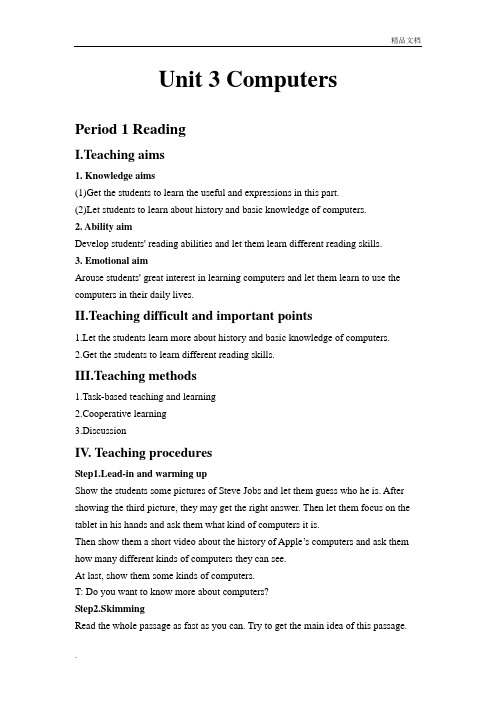
Unit 3 ComputersPeriod 1 ReadingI.Teaching aims1. Knowledge aims(1)Get the students to learn the useful and expressions in this part.(2)Let students to learn about history and basic knowledge of computers.2. Ability aimDevelop students' reading abilities and let them learn different reading skills.3. Emotional aimArouse students' great interest in learning computers and let them learn to use the computers in their daily lives.II.Teaching difficult and important points1.Let the students learn more about history and basic knowledge of computers.2.Get the students to learn different reading skills.III.Teaching methods1.Task-based teaching and learning2.Cooperative learning3.DiscussionIV. Teaching proceduresStep1.Lead-in and warming upShow the students some pictures of Steve Jobs and let them guess who he is. After showing the third picture, they may get the right answer. Then let them focus on the tablet in his hands and ask them what kind of computers it is.Then show them a short video about the history of Apple’s computers and ask them how many different kinds of computers they can see.At last, show them some kinds of computers.T: Do you want to know more about computers?Step2.SkimmingRead the whole passage as fast as you can.Try to get the main idea of this passage.A. The computer wants to find “who he is”.B. The function (功能) of the computer.C. The computer becomes popular around the world.D. The history and the applications of the computer.Find out the topic sentence of each paragraph and underline them.Step3. Careful-reading Para 1ScanningLet the students read this paragraph carefully and try to finish the following char.T: How could these changes become possible?Step4. Careful-reading Para 2Let the students read paragraph 2 quickly and find the answer to this question. After check the answer, give them one minute to find the five different ways of memory for computers in different periods of time.Step5. Careful-reading Para 3Since the memory of computers has been improved greatly, will them become more powerful and can be used in more fields?Now read the last paragraph and find out the new applications of computers.Step6. Further Reading1.The passage is written by_______ order?2. What is the most used rhetoric (修辞法) in this passage?A. simile(明喻)B. personification (拟人)C. metaphor (暗喻)3. In what ways have computer been changed?Ask some students to summarize. If they have any difficulty, give them some hints. Step7. Activity: Be the next Jobs!We have learned the history of computers and seen the great development of computers. What will the computers be like in the future? Do you want to design your computers as Jobs did? Now try to design your computers.For example:This is the new computer designed by our company.It is very small and transparent(透明的). You can even put it into your pocket. (Shape/color)It has a free-internet in it. You can… (Applications/functions)It only costs you … (Price)Give the students five minutes to prepare and invite some of them to show their ideas. Step8. Homework1. Try to retell the history of computers.2. Read the passage carefully and underline the difficult sentences.。
高中英语必修二人教版:Unit+3+Computers+教案3.doc
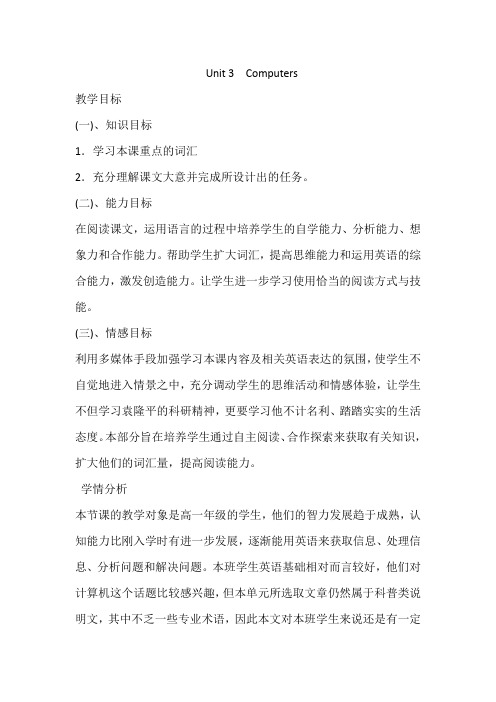
Unit 3Computers教学目标(一)、知识目标1.学习本课重点的词汇2.充分理解课文大意并完成所设计出的任务。
(二)、能力目标在阅读课文,运用语言的过程中培养学生的自学能力、分析能力、想象力和合作能力。
帮助学生扩大词汇,提高思维能力和运用英语的综合能力,激发创造能力。
让学生进一步学习使用恰当的阅读方式与技能。
(三)、情感目标利用多媒体手段加强学习本课内容及相关英语表达的氛围,使学生不自觉地进入情景之中,充分调动学生的思维活动和情感体验,让学生不但学习袁隆平的科研精神,更要学习他不计名利、踏踏实实的生活态度。
本部分旨在培养学生通过自主阅读、合作探索来获取有关知识,扩大他们的词汇量,提高阅读能力。
学情分析本节课的教学对象是高一年级的学生,他们的智力发展趋于成熟,认知能力比刚入学时有进一步发展,逐渐能用英语来获取信息、处理信息、分析问题和解决问题。
本班学生英语基础相对而言较好,他们对计算机这个话题比较感兴趣,但本单元所选取文章仍然属于科普类说明文,其中不乏一些专业术语,因此本文对本班学生来说还是有一定难度。
重点难点(1) 本单元的生词和短语;(2)通过学习本单元,使学生了解计算机的发展历程,及其在当今社会的广泛运用;(3)鼓励学生用英语表达自己的观点,进行简单的推理和做出决定。
(1) 教会学生通过时间的先后顺序来表达一件事;(2) 使学生了和掌握现在完成时的被动语态的用法;(3) 指导学生按类别归纳整理词汇,让学生学会有效地记忆词汇的方法;(4) 引导学生发现本单元重点语言结构,让学生自己发现并感悟相关的语言规律,在学习过程中培养语感。
教学过程活动1 【讲授】Step 1 Warming up Guessing game 请学生看PPT上的图片,说出物品的英文名称。
若学生说不出个别物品名称,教师提供帮助。
然后请学生两人一组讨论问题。
•What do these pictures have in common? •What do they tell you about the development of computers? •What do you think will be the next development ? 通过看图片和回答问题引出本单元话题。
- 1、下载文档前请自行甄别文档内容的完整性,平台不提供额外的编辑、内容补充、找答案等附加服务。
- 2、"仅部分预览"的文档,不可在线预览部分如存在完整性等问题,可反馈申请退款(可完整预览的文档不适用该条件!)。
- 3、如文档侵犯您的权益,请联系客服反馈,我们会尽快为您处理(人工客服工作时间:9:00-18:30)。
Module 2 Unit 3 Computers
主备人:陈黎静授课人:2017.2.14
品味人生
1、不管鸟的翅膀多么完美,如果不凭借空气,鸟就永远飞不到高空。
想象力是翅膀,客观实际是空气,只有两方面紧密结合,才能取得显着成绩。
2、想停下来深情地沉湎一番,怎奈行驶的船却没有铁锚;想回过头去重温旧梦,怎奈身后早已没有了归途。
因为时间的钟摆一刻也不曾停顿过,所以生命便赋予我们将在汹涌的大潮之中不停地颠簸。
3、真正痛苦的人,却在笑脸的背后,流着别人无法知道的眼泪,生活中我们笑得比谁都开心,可是当所有的人潮散去的时候,我们比谁都落寂。
4、温暖是飘飘洒洒的春雨;温暖是写在脸上的笑影;温暖是义无反顾的响应;温暖是一丝不苟的配合。
5、幸福,是一种人生的感悟,一种个人的体验。
也许,幸福是你风尘仆仆走进家门时亲切的笑脸;也许,幸福是你卧病床上百无聊赖时温馨的问候;也许,幸福是你屡遭挫折心灰意冷时劝慰的话语;也许,幸福是你历经艰辛获得成功时赞赏的掌声。
关键的是,你要有一副热爱生活的心肠,要有一个积极奋进的目标,要有一种矢志不渝的追求。
这样,你才能感受到幸福。
6、母爱是迷惘时苦口婆心的规劝;母爱是远行时一声殷切的叮咛;母爱是孤苦无助时慈祥的微笑。
7、淡淡素笺,浓浓墨韵,典雅的文字,浸染尘世情怀;悠悠岁月,袅袅茶香,别致的杯盏,盛满诗样芳华;云淡风轻,捧茗品文,灵动的音符,吟唱温馨暖语;春花秋月,红尘阡陌,放飞的思绪,漫过四季如歌。
读一段美文,品一盏香茗,听一曲琴音,拾一抹心情。
8、尘缘飞花,人去楼空,梦里花落为谁痛?顾眸流盼,几许痴缠。
把自己揉入了轮回里,忆起,在曾相逢的梦里;别离,在泪眼迷朦的花落间;心碎,在指尖的苍白中;淡落,在亘古的残梦中。
在夜莺凄凉的叹息里,让片片细腻的柔情,哽咽失语在暗夜的诗句里。
9、用不朽的“人”字支撑起来的美好风景,既有“虽体解吾犹未变兮”的执着吟哦,也有“我辈岂是蓬蒿人”的跌宕胸怀;既有“我以我血荐轩辕”的崇高追求,也有“敢教日月换新天”的豪放气魄。
33 我是一只蜜蜂,在祖国的花园里,飞来飞去,不知疲倦地为祖国酿制甘甜的蜂蜜;我是一只紫燕,在祖国的蓝天上,穿越千家万户,向祖国向人民报告春的信息;我是一滴雨点,在祖国的原野上,从天而降,滋润干渴的禾苗;我是一株青松,在祖国的边疆,傲然屹立,显示出庄严的身姿。
10、母爱是一滴甘露,亲吻干涸的泥土,它用细雨的温情,用钻石的坚毅,期待着闪着碎光的泥土的肥沃;母爱不是人生中的一个凝固点,而是一条流动的河,这条河造就了我们生命中美丽的情感之景。
11、青春是盛开的鲜花,用它艳丽的花瓣铺就人生的道路;青春是美妙的乐章,用它跳跃的音符谱写人生的旋律;青春是翱翔的雄鹰,用它矫健的翅膀搏击广阔的天宇;青春是奔腾的河流,用它倒海的气势冲垮陈旧的桎梏。
12、失败,是把有价值的东西毁灭给人看;成功,是把有价值的东西包装给人看。
成功的秘诀是不怕失败和不忘失败。
成功者都是从失败的炼狱中走出来的。
成功与失败循环往复,构成精彩的人生。
成功与失败的裁决,不是在起点,而是在终点。
13、母爱是一缕阳光,让你的心灵即便在寒冷的冬天也能感受到温暖如春;母爱是一泓清泉,让你的情感即使蒙上岁月的风尘仍然清澈澄净。
14、不要吝惜自己的爱,敞开自己的胸怀,多多给予,你会发现,你也已经沐浴在了爱河里。
15、奉献是爱心,勇于付出,你一定会收到意外之外的馈赠。
16、人生就像一条河,经历丰富,才能远源流长。
伟大的一生,像黄河一样跌宕起伏,像长江一样神奇壮美。
人生就像一座山,经历奇特才能蔚为大观。
伟大的一生,像黄山一样奇峰迭起,像泰山一样大气磅礴。
经历就是人生的硎石,生命的锋芒在磨砺中闪光;经历就是人生的矿石,生命的活力在提炼中释放。
经历就是体验,经历就是积淀。
没有体验就没有生存的质量;没有积淀,就没有生存的智慧。
人生的真谛在经历中探寻,人生的价值在经历中实现。
17、生命不是一张永远旋转的唱片;青春也不是一张永远不老的容颜。
爱情是一个永恒的故事,从冬说到夏,又从绿说到黄;步履是一个载着命运的轻舟,由南驶向北,又由近驶向远。
18、过去与未来,都离自己很遥远,关键是抓住现在,抓住当前。
19、采一点晨曦,装点一天的清新,捧一把阳光,温暖一季的心情。
雨中潇洒走一回,去释放心底的罗曼蒂克。
一段白云下的遐想,找回的是心灵空间的宽广和飞翔。
听一曲欢快流畅音乐,脸上没有了忧郁的浮云,心中燃烧着一团艳阳。
把笑意写在脸上,人生四季的良辰美景,即如小桥流水,也如风清月明!
20、生命本是一场漂泊的漫旅,遇见了谁都是一个美丽的意外。
我珍惜着每一个可以让我称做朋友的人,因为那是可以让漂泊的心驻足的地方。
有时候会被一句话感动,因为真诚;有时候会为一首歌流泪,因为自然。
要快乐,不止此时,而是一生!。
